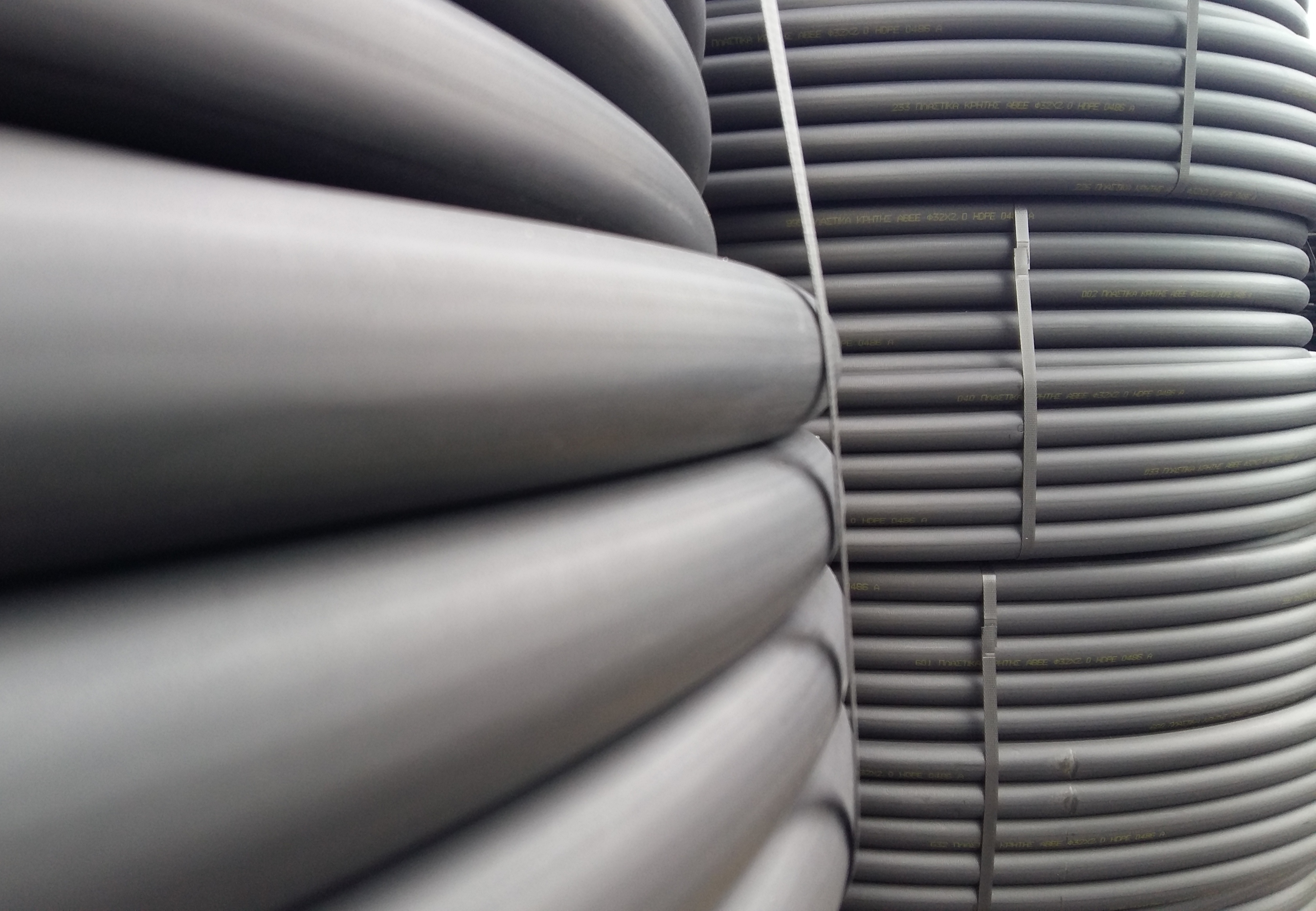PLASTIKA KRITIS manufactures polyethylene pipes for:
- Irrigation and water supply in agriculture
- Potable water supply
- Cable protection in telecommunications
- Natural gas distribution
Pipes for irrigation and water supply in agriculture
PLASTIKA KRITIS manufactures LDPE & HDPE pipes for irrigation and water supply in agriculture:
LDPE irrigation pipes
Specially designed as a reliable and economic solution for irrigation. They are produced with co-extrusion technology in diameters of 16 to 32 mm, from LDPE (low density polyethylene) and LLDPE (linear low density polyethylene). LLDPE offers increased strength and ESCR (environmental stress cracking resistance). They contain 2,5% carbon-black and antioxidants for protection from UV radiation and heat. LDPE pipes are, generally, not recommended for high-pressure water supply networks.
HDPE pressure pipes according to DIN 8074/8075 specifications
These pipes are designed mainly for water supply in irrigation systems. They are produced with selected high density polyethylene (HDPE), which is characterized by its high resistance to pressure, in diameters of 32 to 110 mm, for 4, 6 & 10 bar pressure.
PLASTIKA KRITIS HDPE pressure pipes are made according to DIN 8074/8075 specifications. They contain 2,5% P type carbon-black, with a particle size of less than 25 nm, that ensures the highest possible UV protection and the longest service time. They also contain a special combination of antioxidants for heat protection during processing and use. Due to the low sulfur content of the specific type of carbon-black, the pipes do not impart any odor to the water and are suitable for potable water.
Pipes for potable water supply networks
PLASTIKA KRITIS produces PE 80 & PE 100 pipes for potable water networks in diameters of up to 250 mm.
PE 80 pipes (σ63, MRS 8, PE 80)
These pipes are colored light blue or black. They are produced according to DIN 8074/8075 or PrEN 12201-2 specifications. Pipes manufactured according to PrEN specifications have a thinner wall for equivalent nominal pressure; therefore being lighter in weight and more economic.
PE 100 pipes (σ80, MRS 10, PE 100)
These pipes are colored blue or black with a blue stripe. They are produced according to PrEn 12201-2 specifications. Owing to the higher resistance of PE 100 high density polyethylene, these pipes ensure equal nominal pressure at smaller wall thicknesses relative to PE 80 pipes, thus offering important cost savings.
Joining
Pipe joining in potable water supply networks is made either with butt-fusion or electro-fusion method, with special machinery and fittings by specialized technicians.
HDPE pipes for cable protection
HDPE pipes are used for protection of optical fiber cables in modern telecommunication networks.
The pipes are produced according to DIN 8074/8075 specifications or according to the specifications of a specific project. They are internally ribbed so that friction losses are lower (specification < 0,3) and the installation of cables with compressed air becomes easier.
PLASTIKA KRITIS has supplied thousands of kms of pipes to OTE (National Telecom Organization of Greece) and ROMTELECOM (Romania) since 1993.
Pipes for distribution of natural gas
The distribution of natural gas in cities (low pressure network) is made with special MDPE pipes of yellow or black color.
Very strict specifications and methods are applied in material selection, production process, quality control (objective: zero faults), storage and transport, to make certain that the pipes will be delivered in perfect condition and will have the required service life with absolute safety.
PLASTIKA KRITIS has the essential production and laboratory equipment for this aim and is an authorized supplier of DEPA (National Gas Company of Greece) and EPA (Gas Company of Athens) since 1996.
Advantages of polyethylene pipes
Polyethylene is continuously gaining ground for potable water networks over pipes made of other materials (PVC, iron etc.). The more important advantages of polyethylene pipes are:
- Fast – Easy – Economic Installation
- High flexibility;
- Can be made in long lengths thus requiring less joints
- Ease of handling and laying
- Jointing of fittings possible in networks under pressure
- Welding can take place outside the ditch
- Smaller depth and width of ditch
- Excellent mechanical & chemical properties
- Excellent impact strength
- Lower friction losses
- Better behavior on water hammer
- High resistance in chemical corrosion, internal and external
- No migration of substances from and to the water
- No built up of mineral sediments
- Network reliability
- Earthquake safe networks
- No leakages
- Absolute compatibility between pipes and fittings
- UV resistance
- Possibility of surface networks (with black pipes)


